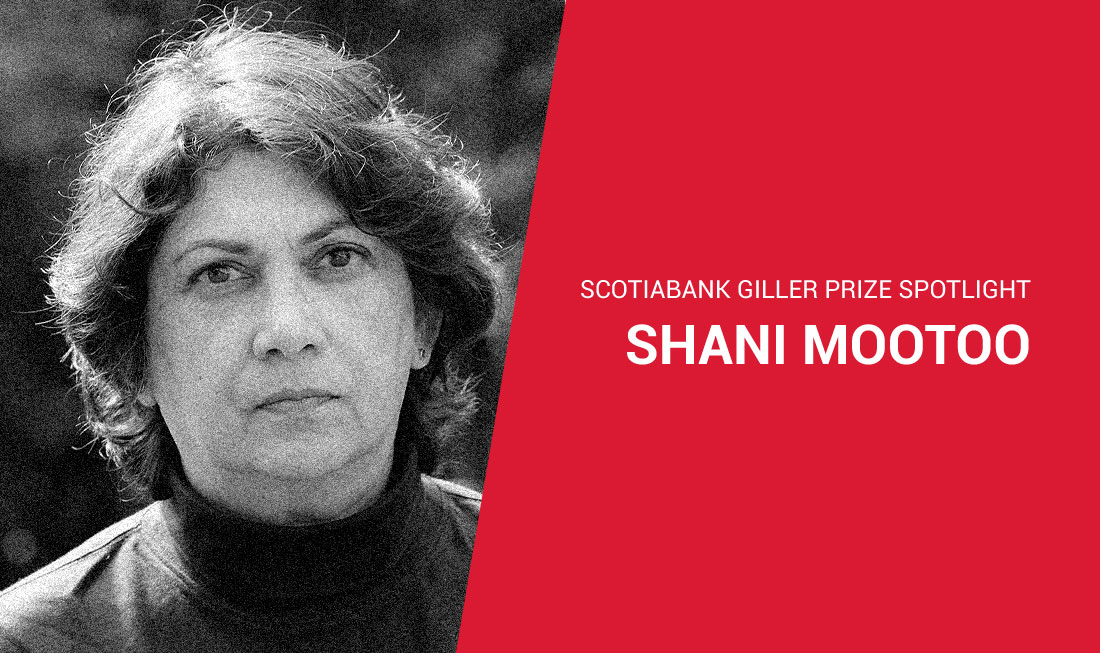Scotiabank Giller Prize Spotlight: Shani Mootoo
September 16, 2020
Shani Mootoo’s novel, Polar Vortex has been longlisted for the 2020 Scotiabank Giller Prize.
Shani was born in Ireland, grew up in Trinidad, and lives in Canada. She holds an MA in English from the University of Guelph, writes fiction and poetry, and is a visual artist whose work has been exhibited locally and internationally. Mootoo’s critically acclaimed novels include Moving Forward Sideways Like a Crab, Valmiki’s Daughter, He Drown She in the Sea, and Cereus Blooms at Night. She is a recipient of the K.M. Hunter Artist Award, a Chalmers Arts Fellowship, and the James Duggins Mid-Career Novelist Award from the Lambda Literary Awards. Her work has been long- and shortlisted for the Scotiabank Giller Prize, the International DUBLIN Literary Award, and the Booker Prize. She lives in Prince Edward County, Ontario.
What/who inspires you to write?
Something happens out in the world—usually some gesture made by someone in my orbit, some little thing—and it catches my eye, my ear, my fancy. I might become nagged by it, and so little narratives begin to form around it. If this thing I call a gesture continues to worry me, I might, say after about a month of this, find myself compelled to pursue the right words with which to understand this still hazy, yet persistent thought-itch. I am then, most likely, on my way to writing a novel.
Do you have a favourite passage/quote from a book?
My longtime favourite passage comes from John Wyndham’s, The Chrysalids. “If you run away from a thing just because you don’t like it, you don’t like what you find either. Now, running to a thing, that’s a different matter…”
Where is your favourite place to write? Is there an activity you do to help inspire your writing?
I like writing close to where my parrots—two African Grays and two rambunctious caiques—are housed. Their constant twittering, frequent squawks, and peekaboo, Good night, What are you doing? keep me grounded, and keep me from flying too far away into the plot and characters. You’d think burrowing in would be a good thing—but I sometimes need a string to hold onto.
Do you have a tradition for every time you finish a book?
I have another life as a photography artist and so, at the end of writing a novel, after having immersed myself in words on paper, I want nothing more than to re-enter the world through visual image-making. Photography starts out as a palate-cleanser, but in time I will have become as lost in the photography as I was in the writing. Nearing the end of a book, I long for this exchange.
What are you reading now?
I recently read and thoroughly enjoyed Split Tooth by Tanya Tagaq. It is not a straightforward narrative, is very poetic, musical, and if you live in the south and are like me, you have to suspend a great deal of your sense of time, of logic, knowledge, disbelief and language. I love it when reading opens and bends my mind, makes me see what I couldn’t before.
What is your favorite CanLit book?
I am too fickle to answer this question. If I go on to finish reading a book, I tend to become deeply engrossed in many aspects of it—the craft, voice, the times, the big ideas–and that book is all there is, until I pick up the next one. Until then, the one in hand is always the most interesting ever written.
What would your job be if you weren’t an author?
If I were not an author, I’d be a bicycling photographer who purchases ingredients from farms along my route and prepares meals for people I meet as I go. Since this is fantasy, I’ll imagine that I am exceedingly rich and can afford that life.
What is your favourite book from childhood?
In 1961, when I was four years old, my grandparents who lived in England sent me and my siblings in Trinidad three very large, extremely heavy, and very serious-looking tomes, published by The New Education Press. One of them, World-Famous Paintings, compiled by Adrian Bury, A.R.W.S. and Charles Richard Cammell, has remained one of my all-time favourite books. I was introduced to Constable, Cezanne, Botticelli, Michelangelo, Van Gogh, Turner, and many, many other painters—whom I love to this day.
What inspired you to write your Scotiabank Giller Prize-nominated book?
I began writing a very sweet love story told to me by a friend who asked me to write it for him. I loved the story he told me and thought I’d enjoy writing it. That’s how I began. But to tell the truth, some thirty pages in, I began to find that story much too sweet, almost unbelievable. My own tendency to disbelieve and question yanked me away from this story, and sent me on a search for what might and might not have been understood, or said, or done by and to each of the characters. I also wanted, as a Trinidadian living in Canada for more than 40 years now, to try and write the Southern Ontario landscape, not as a tourist or an immigrant, but as someone who has become grounded and thrives in it. This sense of groundedness that I was able to articulate for myself through the writing of Polar Vortex, places this novel among my favourite creative projects.
What do you hope readers take away from your book?
No matter how well you think you know someone, you may not actually know if what they’re telling you can be counted on to be the truth. You can do your best to over your tracks, but the past always has a way of coming back to bite you.

